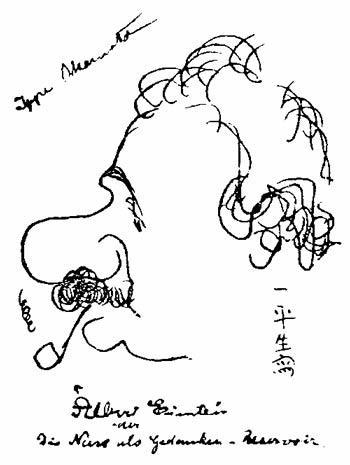
This Article From Issue
January-February 1998
Volume 86, Number 1
DOI: 10.1511/1998.17.0
The Quotable Einstein. Collected and edited by Alice Calaprice. xxxiv + 269 pp. Princeton University Press, 1996, $16.95.
Alice Calaprice, in-house editor of The Collected Papers of Albert Einstein (Princeton University Press, 1987–1997), administrator of PUP's translation project and recipient of the 1995 LMP Award for Individual Editorial Achievement in Scholarly Publishing, has collected 557 quotations by Einstein and 51 quotations about Einstein, all with complete reference citations, along with 18 quotations attributed to Einstein, but not confirmed as being by Einstein. Her anthology also contains an updated family tree that includes great-great-grandchildren; a chronology succinctly summarizing Einstein's personal life and career; answers, some of them surprising, to the most common nonscientific questions about Einstein, topically arranged; a bibliography with books as late as 1995; a subject index; and an index of key words to help readers locate familiar quotations.

From The Quotable Einstein.
Einstein's thoughts and ideas are arranged thematically in 16 sections on the following topics: Einstein himself; America and Americans; death; education and academic freedom; family; friends, specific scientists and others; Germans and Germany; humankind; Jews, Israel, Judaism and Zionism; life; pacifism; peace, war, the bomb and the military; politics, patriotism and government; religion, God and philosophy; science and scientists, mathematics and technology; and miscellaneous (alphabetically organized from abortion to youth).
The quotations, which introduce the reader to Einstein's many sides, chronicle his development from age 17 ("A happy man is too satisfied with the present to dwell too much on the future.") to his final words at age 76 ("I have finished my task here."). Besides all the familiar t-shirt and poster quotations (for example, "Imagination is more important than knowledge."), there are many unfamiliar ones. In addition to an excerpt from the famous letter composed by Leo Szilard and signed by Einstein is the unfamiliar statement, "I made one mistake in my life—when I signed that letter to President Roosevelt advocating that the atomic bomb should be built." Similarly, in balance to Einstein's well-known statements about quantum mechanics, Calaprice includes the less well known: "I have second thoughts. Maybe God is malicious."
This is not the first anthology of Einstein quotes. In Albert Einstein, the Human Side (Princeton University Press, 1979), Helen Dukas, Einstein's secretary and keeper of his archives, and her coeditor, Banesh Hoffmann, presented the view of Einstein that she wanted the world to see. In his foreword to the Calaprice collection, Freeman Dyson characterizes the Einstein of Dukas as "the Einstein of legend, the friend of school children and impoverished students, the gently ironic philosopher, the Einstein without violent feelings and tragic mistakes." In contrast, Calaprice has chosen her quotes for this book impartially, revealing, but not emphasizing, Einstein's darker side, especially with regard to his family. It is a collection that, as Dyson says, shows Einstein "as he was—not a superhuman genius but a human genius, and all the greater for being human."—George B. Kauffman and Laurie M. Kauffman, Chemistry, California State University, Fresno
American Scientist Comments and Discussion
To discuss our articles or comment on them, please share them and tag American Scientist on social media platforms. Here are links to our profiles on Twitter, Facebook, and LinkedIn.
If we re-share your post, we will moderate comments/discussion following our comments policy.